GwinnettForum | Number 20.72 Oct. 6, 2020
HERE’S A RESTFUL COASTAL SCENE, where little obvious is going on, a painting entitled “Nick’s Place,” done on commission by Karen Garner, formerly of Dacula, but now residing in Robesonia, Penn. Though this scene looks quiet, you know there are all types of life teeming under these coastal waters, as crab, fish, shrimp and all sorts of underwater life abound among the marsh grass and mud. And if you’re lucky enough to be sitting idly by in a house, or on a boat, or just resting on a little mound, it’s a peaceful scene that many people happily enjoy.
 TODAY’S FOCUS: Group outlines differences between 2019 and 2020 transit referendums
TODAY’S FOCUS: Group outlines differences between 2019 and 2020 transit referendums
EEB PERSPECTIVE: Help solve Gwinnett traffic problems by approving upcoming referendum
ANOTHER VIEW: Looking at technical advancements and Orwell’s 1984 world
SPOTLIGHT: MTI Baths Inc.
FEEDBACK: Mystery Photo brings back memories of Naples and Isle of Capri
UPCOMING: Great Days of Service has a new mission—restocking COVID pantries
NOTABLE: PCOM physical therapy students find adaptive sports beneficial
RECOMMENDED: Paris by Edward Rutherford
GEORGIA TIDBIT: David Barrow was University chancellor; also led in other ways
MYSTERY PHOTO: Perhaps too easy, check out this issue’s Mystery Photo
Differences between 2019 and 2020 transit referendums
By Fred Dawkins,
Chair, Gwinnett Transit Educational Forum Inc.
LAWRENCEVILLE, Ga. | Gwinnett Transit Education Forum, Inc. (GTEF) is comprised of Gwinnett County community and business leaders who believe that educating voters on the 2020 Transit Referendum facts, the list of transit projects, the service providers and more will help residents ‘choose their direction’ when they cast their vote on November 3. GTEF is not advocating for or against the referendum, but simply ensuring voters have the facts.
GTEF Executive committee members include:
- Fred Dawkins, Frederick C. Dawkins of Snellville, Esq., P.C., chairman;
- Mike Levengood, Law Office of J. Michael Levengood, Lawrenceville,LLC, vice chairman;
- Michael Sullivan, Snellville, ACEC Georgia, treasurer;
- Jordan Hall, Atlanta, Statewide Independent Living Council of Georgia, member; and
- Michael Park, Duluth, The Whitlock Group, secretary.
In mid-September, GTEF launched a website at www.gwinnetttransitedu.com to provide the latest facts about the proposed one sales cent tax, and the site details the project types with a link to a map of the system at build out. In addition, GTEF is sending email newsletters with the latest information to ensure Gwinnett citizens understand the scope of the 80+ projects, the transit coverage and the fact that Gwinnett County Transit will operate and manage the system with the exception of heavy rail, which is mandated by state law to be operated by MARTA.
In addition to the website and newsletters, GTEF has developed a one-page fact sheet and videos and members of the executive committee have been speaking with business and civic organizations to review the differences between the 2019 and 2020 Transit referendums and ensure voters understand this year’s referendum changes.
Bottom line, the 2020 Transit Referendum has three main differences from the 2019 referendum, which include:
- The transit system coverage will have broader county coverage
- A majority of the system improvements will be implemented in the first 10 years, versus the first 20 years; and
- Gwinnett County will operate and manage the entire system with the exception of heavy rail.
Below is a detailed comparison of the proposed projects from 2019 vs. 2020:
2019 Transit Referendum VS. 2020 Transit Referendum
| 1 Heavy Rail Transit (HRT) extension to Jimmy Carter Blvd. | 1 Heavy Rail Transit (HRT) extension to Jimmy Carter Blvd. |
| 3 Bus Rapid Transit (BRT) routes | 4 Bus Rapid Transit (BRT) routes |
| 8 Rapid/Arterial Rapid Transit (ART) routes | 7 Arterial Rapid Transit (ART) routes |
| 9 Express Commuter Bus routes | 13 Commuter Bus routes (one route upgraded to Direct Connect route over time) – Covers ~80% of I-85 – Covers ~100% of I-985, SR 316 and Hwy 78 |
| 3 Direct Connect routes | 3 Direct Connect routes |
| 12 Local Bus routes | 23 Local Bus routes (8 upgraded to BRT/ART over time) |
| 8 FLEX/Microtransit zones | 8 Microtransit zones |
| Extended evening and added Sunday services on all routes | Extended evening and added Sunday services on all routes |
| New Transit Centers at Infinite Energy, Georgia Gwinnett College and Lawrenceville and upgrades to Gwinnett Place | |
| Increased paratransit coverage and vanpool subsidies | |
| More fixed-route coverage in the county, including routes in Lilburn, Sugar Hill and Suwanee, Buford and Snellville | |
| Added regional coverage | |
| $65M – $75M in pedestrian connections | |
| Implementation within the first 20 years | Majority implementation within the first 10 years |
Don’t Stop at the Top! As a final reminder, the Gwinnett County ballot is long this year, and the E-SPLOST and Transit referendums will be at the bottom. GTEF is encouraging voters to be sure to read and make their selections from top to bottom before casting their ballots.
For more information, visit www.gwinnetttransitedu.com or visit Gwinnett County’s interactive transit map at www.gwinnett-transit.com
- Have a comment? Send to: elliott@brack.net
Solve Gwinnett traffic problems by approving referendum
By Elliott Brack
Editor and Publisher, GwinnettForum
OCT. 6, 2020 | On May 9, 1977, I was attending a high-tech seminar in Boston, Mass. About 2 p.m. sitting in class on a Wednesday, it started snowing. Almost immediately the snow intensified. By 3:30, officials halted the class, saying we would resume the next morning. We returned to our hotel.
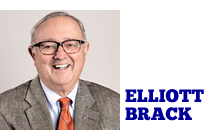 But by morning, officials were calling the storm a “northeaster.” Snowfall was heavy. There was little traffic on the streets. Boston was marooned for several days, the National Guard was called out, and most were stranded. We were left with nothing to do, and it was too cold to go outside.
But by morning, officials were calling the storm a “northeaster.” Snowfall was heavy. There was little traffic on the streets. Boston was marooned for several days, the National Guard was called out, and most were stranded. We were left with nothing to do, and it was too cold to go outside.
When packing for the trip, I debated what clothes to take along that spring. I chose a light jacket. As the storm continued, I needed a heavier jacket, and stayed inside the Copley Plaza hotel. Meanwhile, the seminar was cancelled, but my return ticket was for Saturday, and anyway, planes were also stranded. Learning that the subway was running, another Southerner needing warmer clothing and I took the subway to Filene’s Basement. There I bought a much-needed raincoat with a heavy liner for a few dollars. It did the trick. By Saturday, I caught the plane back to Atlanta.
Wikipedia tells us: “Boston’s subway was the first in the United States….. In 1897 and 1898, the Tremont Street subway opened as the core of the precursor to the Green Line. In 1901, the Main Line Elevated, the precursor to the Orange Line opened.”
That subway trip to Filene’s Basement was on the first part of that original subway. While all street traffic was halted because of the snow, that ancient subway moved people effortlessly.
In 1890, Boston had a population of 448, 477. And we would think that as in all city governments, money was tight. But somehow, someway, good leadership emerged, and Bostonians found a way to raise money to build that subway line. And 70+ years later, I was able to stay warm because they appropriated those early dollars for the rapid transit line.
Let’s vault ahead to Gwinnett today: what is the top problem facing our county? Some would say Gwinnett needs to find a way to join the 21st century and provide an alternate way to move people around. If Gwinnett doesn’t do this, it will be up the creek without a paddle on transportation, getting more dependent vehicles and in even more traffic. Add even more frustrated.
Once built, will everyone use more rapid transit? No. But enough will use it to make a difference in congestion.
On the ballot this year is a proposal to start the process of rectifying the traffic situation. It is a multi-level proposal that takes several forms, all needed to move us around better.
It faces Gwinnett similarly to the way Boston voters were challenged with their mobility problem years ago. Boston voters had the foresight to listen to their leaders, and fund a far-out venture that results today in a vast array of subways and trains to keep that city among the world leaders when it comes to movement of people.
There is no one solution about what type of system to build. We need train tracks, but also bus rapid transit, perhaps even street cars, and other innovative solutions.
Gwinnett, now nearly a million strong, needs to get behind this 2020 proposal and approve the upcoming referendum, to allow their leaders to work out the right solutions to this problem.
It is the right thing to do so that individuals, like I was in Boston 43 years ago, can move around Metro Atlanta and solve traffic problems in a greatly-improved manner.
- Have a comment? Send to: elliott@brack.net
Looking at technical advancements and Orwell’s 1984 world
By Debra Houston, contributing columnist
LILBURN, Ga. | Journalist Bob Woodward recently remarked, “We are living in an Orwellian world.” The word “Orwellian” refers to George Orwell who wrote 1984. His masterpiece describes a dystopian society not unlike North Korea today. Let’s see if Orwell’s world is anything like ours, remembering that this book was first published in 1949.
![]() You’ve heard the phrase, “Big Brother is watching you.” Big Brother is a fake, ubiquitous dictator that the party (an oligarchy government) creates to scare people into a “no-questions-asked” obedience. Winston Smith, the main character, believes Big Brother isn’t real, but, saying so would result in an execution.
You’ve heard the phrase, “Big Brother is watching you.” Big Brother is a fake, ubiquitous dictator that the party (an oligarchy government) creates to scare people into a “no-questions-asked” obedience. Winston Smith, the main character, believes Big Brother isn’t real, but, saying so would result in an execution.
Big Brother snoops on people in their apartments through a “telescreen,” a kind of computerized two-way television with an inside camera and motion detector technology. Constant surveillance fosters Wilson’s paranoia (not unlike Zoom). If the telescreen detects a change in the occupant’s demeanor or habits, he risks being accused of “thought crimes.” Winston is, in fact, thinking of revolt and plotting how to approach it.
When Wilson walks to work, he passes posters along the street with party slogans: “War is Peace” – “Freedom is Slavery” – “Ignorance is Strength.” Wilson himself writes propaganda at the Ministry of Truth.
Wilson writes his stories in an abbreviated English-based language called “Newspeak.” The difference is that Newspeak uses different grammar and altered vocabulary. The best comparison is to our text messaging – short sentences with often peculiar words. The purpose of “Newspeak” is to remove complex human thought.
Wilson hates creating propaganda, but he’s good at his job of rewriting history that exalts the Party. Under no circumstance can he refer to actual history, the arts, literature, philosophy, religion, or science. These only lead to greater complex human thought.
So that’s a short synopsis of the book: does it sound like America to you? If we’re honest we’ll admit that we feel spied on thanks to technology, chiefly on social media. Then too, our browser picks up “cookies” that track our online interests, and our personal history is sold to third parties, whoever they are. Smart phones track where we’re headed, and though we think our conversations are private, who’s to say the government can’t listen in?
We also should be careful about propaganda disguised as innocent slogans. I watched a television advertisement that said, “No life matters until all Black Lives Matter (BLM).” Although we can’t say “all lives” because it takes the focus off black lives, everyone’s life matters in a democracy. BLM is telling us what to say in politically correct speech, not unlike the party forcing Newspeak on people in Orwell’s world.
Also, yes, we have fake news, especially during elections. Candidates and news agencies manipulate us with spun reports designed to divide us. In addition, I heard a Marxist say we should eliminate American history. On the contrary, we should urge students as well as adults to study it ardently! How else will we know they’re lying to us?
As long as we have the freedom to vote, we’re safe from a closed society. And, if we faithfully participate in voting, we’ll never have a Big Brother controlling us.
- Have a comment? Send to: elliott@brack.net
MTI Baths Inc.
 The public spiritedness of our sponsors allows us to bring GwinnettForum.com to you at no cost to readers. Today’s featured sponsor is MTI Baths Inc. of Sugar Hill. MTI Baths is a manufacturer of high-quality acrylic and engineered solid surface bath products, including whirlpools, air and soaking baths; lavatories; shower bases; and kitchen sinks. MTI’s patented Fill-Flush® and Simple Touch® whirlpool cleaning systems are the best on the market. MTI now offers engineered solid surface–countertops and sinks. Every product is custom-made to order and shipped within seven business days. We are now operating in an additional manufacturing plant of 38,000 square foot. CEO of the firm is Kathy Adams, while Russell Adams is president.
The public spiritedness of our sponsors allows us to bring GwinnettForum.com to you at no cost to readers. Today’s featured sponsor is MTI Baths Inc. of Sugar Hill. MTI Baths is a manufacturer of high-quality acrylic and engineered solid surface bath products, including whirlpools, air and soaking baths; lavatories; shower bases; and kitchen sinks. MTI’s patented Fill-Flush® and Simple Touch® whirlpool cleaning systems are the best on the market. MTI now offers engineered solid surface–countertops and sinks. Every product is custom-made to order and shipped within seven business days. We are now operating in an additional manufacturing plant of 38,000 square foot. CEO of the firm is Kathy Adams, while Russell Adams is president.
- Visit their web site at http://www.mtibaths.com/.
- For a list of other sponsors of this forum, click here.
Mystery Photo brings back memories of Naples, Capri
Editor, the Forum:
![]() Enjoyed that mystery photo of Capri! In 1955-1956, I was aboard the U.S.S. Intrepid, an aircraft carrier (CVA-11) with the Marine Detachment. We made two “Med” cruises and naturally we visited Naples, a beautiful city, with many fine restaurants and much art. But the harbor, then, was filthy!
Enjoyed that mystery photo of Capri! In 1955-1956, I was aboard the U.S.S. Intrepid, an aircraft carrier (CVA-11) with the Marine Detachment. We made two “Med” cruises and naturally we visited Naples, a beautiful city, with many fine restaurants and much art. But the harbor, then, was filthy!
Because of the Intrepid’s draft, we had to anchor at a “mole,” just outside the harbor, and ride our “liberty launches” in to visit.
I remember watching the boat which carried visitors to Capri come taxiing by our ship. It was a very large boat, 75 to 100 feet long. It had two hydrofoils mounted on the hull that ran lengthwise: think water skis. After the boat got past us, the captain would accelerate and the boat would rise up and run swiftly, on the hydrofoils, just like a person does when water skiing! The 20 mile run was a piece of cake, so to speak. I didn’t take the trip to Capri and still regret it.
Incidentally, we Americans call the Isle, “Ca-PREE.” Remember the song? Over there, It is pronounced “KOP’-ree.”
— David Earl Tyre, Jesup
Send us your thoughts: We encourage you to send us your letters and thoughts on issues raised in GwinnettForum. Please limit comments to 300 words. We reserve the right to edit for clarity and length. Send feedback and letters to: elliott@brack.net
Coalition has a new mission — restocking COVID pantries
By Suzy Bus,
Program director, Gwinnett Coalition for Health and Human Services
LAWRENCEVILLE, Ga | Gwinnett Great Days of Service, a program of the Gwinnett Coalition for Health and Human Services in 2020, is in its 21st year of service. These days of service mobilize thousands of individuals, corporations, churches, schools, civic organizations, and government entities in meaningful volunteer service to address some of the county’s most critical needs.
This year, we are in unprecedented times with the coronavirus. This calls for all hands on deck!
Gwinnett Great Days of Service (GDOS) will be traveling down a different road for its service days this October. The coronavirus has hit Gwinnett hard and impacted all of us in many different and challenging ways. Many in our community are struggling to meet basic needs such as food, cleaning supplies and personal care items. Our helping agencies are in very short supply of these necessary provisions. This is where we can all make a real difference by calling for a massive collection, sorting, delivering and helping days!
 Gwinnett Great Days of Service will be organizing collections of the different items through October 22 in various venues across the county: neighborhoods, families, schools, business offices, churches, medical centers and wherever there is an opportunity to help meet needs.
Gwinnett Great Days of Service will be organizing collections of the different items through October 22 in various venues across the county: neighborhoods, families, schools, business offices, churches, medical centers and wherever there is an opportunity to help meet needs.
Items collected will be shared amongst our many front line service providers who will hand them out to our Gwinnett County individuals and families affected by COVID-19.
The GDOS Planning team, from the Gwinnett Coalition for Health and Human Services and other community members, is headed up by our Committee Chairperson Layna Weldon of State Farm. This active team has been recruiting sites all over the county to hold collections. Deliveries of the items donated will take place on October 23-24, 2020, the “official” service days.
GDOS t-shirts have been collector items over the years. They are always free to active volunteers. This year, because of the massive needs from COVID-19, we have designed a special t-shirt that can be purchased for $25. Why this charge? To help us raise extra funds to meet the critical needs in our community. If you cannot collect, please buy a t-shirt and help support this important cause.
For more information on how you can get involved or buy one of the limited edition t-shirts, please visit our website www.gwinnettgreatdaysofservice.org, email us at info@gwinnettcoalition.org or give us a call at 770 995 3339. There is still plenty of time to hold a collection or make a donation at an established location – they are all listed on our website.
PCOM students find adaptive sports beneficial
While learning about adaptive sports, third-year Doctor of Physical Therapy students recently experienced playing basketball and performing drills in wheelchairs on the campus of PCOM Georgia.
Robert Kane (DPT ’21) says: “Adaptive sport experiences give you a new perspective into the challenges, equipment and competitive drive of para-athletes. It’s incredible to be able to learn and gain knowledge as a future healthcare provider to promote adaptive sports.”
According to Physical Therapist Dr. Shelley DiCecco, assistant professor in the Department of Physical Therapy, these professionals often play a vital role in adaptive sports, which began as a way to rehabilitate veterans. In the 1960s, she says, an organization known as Disabled Sports USA started organizing sports for disabled athletes. Sports can include basketball, snow and water skiing, golf, fishing, kayaking, running, horseback riding, cycling, paddling, volleyball, swimming, tennis and several other activities.
Aside from encouraging patients to participate in sports, Dr. DiCecco said, physical therapists assist in wheelchair fittings, select and fit prostheses, help athletes increase strength, endurance and motion, and rehab injuries of athletes who wish to return to the sport.
She added, “With adaptive sports, modifications are made so the person can participate in the sport and often the disability type is placed in a classification system so athletes with similar disabilities play each other.”
Prior to COVID-19, the physical therapy department had planned for local athletes currently participating in adaptive sports to help educate the physical therapy students. Alaina Bell, an instructor in the Department of Physical Therapy, says: “When this wasn’t possible, one group of physical therapy students was assigned to research and provide a thorough introduction into adaptive sports. Wearing appropriate PPE, the students then worked in small groups to perform basketball skills in a wheelchair.
“From this experience, the students obtained a greater appreciation for how much more difficult it is to dribble, pass, throw and retrieve a ball while in a wheelchair,” Dr. Bell says. “They learned how the muscles are used differently and where one would need to focus on strength training or stretching to be able to complete the necessary skills.”
Annette Nowicki (DPT ’21) said learning about adaptive sports was “eye-opening” for many reasons. “These patients have gone through a traumatic experience, so being able to incorporate sports and promote physical activity gives our patients hope, motivation and a sense of belonging. As future physical therapists, we have the opportunity to strengthen, motivate and assist patients to get back to what they love doing, or even show them that they can do anything they want.”
Robert Kane (DPT ’21) says: “Adaptive sport experiences give you a new perspective into the challenges, equipment and competitive drive of para-athletes. It’s incredible to be able to learn and gain knowledge as a future healthcare provider to promote adaptive sports.”
Paris by Edward Rutherford
![]() From Karen J. Harris, Stone Mountain: Paris is another in a series of Edward Rutherford’s fictional accounts of history, such as Sarum, London, China, and New York. Paris deals with the time of the Knights Templar up to and through World War II, ending in 1968, as seen through the lives of several families. The story begins in 1875, but weaves back and forth in time as far back as 1261, for a total 28 chapters. The fortunes of the families are replete with friendship, enmity, suspicion and grudging support as the tapestry that is French history is spilled forth in the relationships which propel the country forward. Filled with fascinating detail and characters that are outwardly sterling, inwardly querulous, and filled with the light and dark places that exist in all of mankind. It is a challenging read but well worth the effort, especially for Rutherford fans and those that love historical fiction.
From Karen J. Harris, Stone Mountain: Paris is another in a series of Edward Rutherford’s fictional accounts of history, such as Sarum, London, China, and New York. Paris deals with the time of the Knights Templar up to and through World War II, ending in 1968, as seen through the lives of several families. The story begins in 1875, but weaves back and forth in time as far back as 1261, for a total 28 chapters. The fortunes of the families are replete with friendship, enmity, suspicion and grudging support as the tapestry that is French history is spilled forth in the relationships which propel the country forward. Filled with fascinating detail and characters that are outwardly sterling, inwardly querulous, and filled with the light and dark places that exist in all of mankind. It is a challenging read but well worth the effort, especially for Rutherford fans and those that love historical fiction.
An invitation: what books, restaurants, movies or web sites have you enjoyed recently? Send us your recent selection, along with a short paragraph (150 words) as to why you liked this, plus what you plan to visit or read next. Send to: elliott@brack.net
Barrow was University chancellor; also led in other ways
David Barrow Jr. served as chancellor of the University of Georgia from 1906 to 1925, a position roughly analogous to the modern presidency of that institution. Through background, hard work, and an amiable personality, Barrow became one of Georgia’s leading public servants.
Barrow’s dedication to public service and education was in part an outgrowth of his family’s tradition. David Crenshaw Barrow Jr. was born in 1852 in Oglethorpe County, where his father, David C. Barrow Sr., was a leading planter and a trustee of the university. His mother, Sarah Pope Barrow, was the granddaughter of former governor and senator Wilson Lumpkin. She died when Barrow was three. The principal influences on his character were his father, his maternal grandmother, Lucy Lumpkin Pope, and his governess (later his stepmother), Priscilla Flint Sawyer. Barrow’s values were also molded by a conversion to Methodism as a young man.
Barrow was educated at the University of Georgia, receiving both a B.S. and a degree in engineering in 1874. After trying the law and geological surveying, he became in turn a popular professor of mathematics and engineering, a department head, dean, acting chancellor, and in 1906, chancellor. Barrow led the university through a period of great growth.
At the time of his appointment as chancellor, the University of Georgia could be accurately described as a collection of colleges, consisting of a liberal arts college, a law school, a summer school, beginning schools of pharmacy and forestry, an embryonic college of agriculture, and some graduate courses in various fields. When Barrow retired in 1925, the university had become a modern institution, with an established college of agriculture, much-strengthened versions of the 1906 schools, new schools of education, commerce, and journalism, and a structured graduate school. Regular enrollment had more than quadrupled because of Barrow’s efforts and the admission of female students. Faculty size had tripled, funding had increased greatly, and several new buildings had been constructed on campus.
Barrow’s contributions to the university, however, cannot be measured solely in statistics. His moral and spiritual influence on students was of equal—perhaps greater—importance. Barrow’s accomplishments were also partly due to his political astuteness. He also used his political skills in dealing with the usual problems of administering a university, such as the place of intercollegiate athletics and the role of powerful deans with statewide constituencies (especially the College of Agriculture). Barrow often had to lobby the legislature for funds. He also served as the neutral arbitrator in the Central of Georgia Railway strike in 1909.
Barrow’s personal life was also rich and full. He married Frances Ingle Childs of Athens in 1879, and they had four children and ten grandchildren. Barrow’s name survives in Barrow County, in an Athens elementary school and an Athens street, and at the University of Georgia in Barrow Hall and the David C. Barrow Chair of Mathematics. Barrow died in 1929.
- To view the Georgia Encyclopedia article online, go to http://georgiaencyclopedia.org
Perhaps too easy, check out this issue’s Mystery Photo
There’s an interesting, world-wide story behind today’s Mystery Photo. We suspect that it’s a relatively easy photo, though you can never tell. Send your thoughts of this mystery to elliott@brack.net and include your hometown.
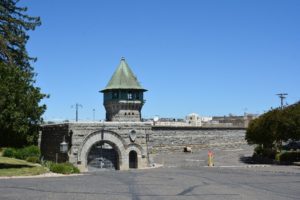 The last mystery photo brought an immediate reply from Kay Everett of Lawrenceville. “It’s Folsom State Prison Entrance in California. We saw it on our last trip to San Francisco as we were heading into Wine Country.” The photo came from Beverly Lougher of Lawrenceville. Lou Camiero of Lilburn put a different spin on the photo: “This is the location of Johnny Cash’s most favorite concert, Folsom Prison, California.”
The last mystery photo brought an immediate reply from Kay Everett of Lawrenceville. “It’s Folsom State Prison Entrance in California. We saw it on our last trip to San Francisco as we were heading into Wine Country.” The photo came from Beverly Lougher of Lawrenceville. Lou Camiero of Lilburn put a different spin on the photo: “This is the location of Johnny Cash’s most favorite concert, Folsom Prison, California.”
Also recognizing the photo was Jim Savadelis, Duluth; Susan McBrayer, Sugar Hill; and Allan Peel of San Antonio, Tex. He wrote: “With the COVID pandemic raging, Johnny Cash’s song is playing through my head as I attempt to stay safe and away from most folks … ‘I’m stuck in Folsom Prison, and time keeps dragging’ on …’. Today’s slow pace of life with COVID sure feels like a prison, doesn’t it?
“Folsom State Prison is located 20-miles northeast of Sacramento, in Folsom, Calif. It is California’s second-oldest prison (after San Quentin) and one of the nation’s first maximum-security prisons built after the Gold Rush. The first cell blocks were completed in 1878. It was also the first prison in the country to have electric lights. Currently Folsom State Prison is a Minimum-to-Medium security class prison with a capacity of 2,469 prisoners (both men and women). As of April 30, 2020, they were at 120 percent capacity with 2,970 inmates being incarcerated within its walls.”
George Graf of Palmyra, Va. listed some of the people who have been jailed at Folsom. They include Eldridge Cleaver, early leader of the Black Panther Party; Rick James, musician; Charles Manson, murderer, conspirator; Bobby Purify, original singer of ‘I’m Your Puppet’’ and among others, Timothy Leary, psychologist and writer.”
GwinnettForum is provided to you at no charge every Tuesday and Friday.
Meet our team
- Editor and publisher: Elliott Brack, 770-840-1003
- Managing editor: Betsy Brack
- Roving photographer: Frank Sharp
- Contributing columnist: Jack Bernard
- Contributing columnist: Debra Houston
- Contributing columnist: George Wilson
More
- Location: We are located in Suite 225, 40 Technology Park, Peachtree Corners, Ga. 30092.
- Work with us: If you would like to serve as an underwriter, click here to learn more.
Subscriptions to GwinnettForum are free.
- Click to subscribe.
- Unsubscribe. We hope you’ll keep receiving the great news and information from GwinnettForum, but if you need to unsubscribe, go to this page and unsubscribe in the appropriate box.
© 2020, Gwinnett Forum.com. Gwinnett Forum is an online community commentary for exploring pragmatic and sensible social, political and economic approaches to improve life in Gwinnett County, Ga. USA.




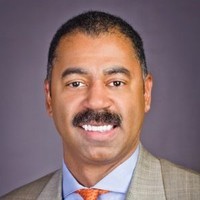
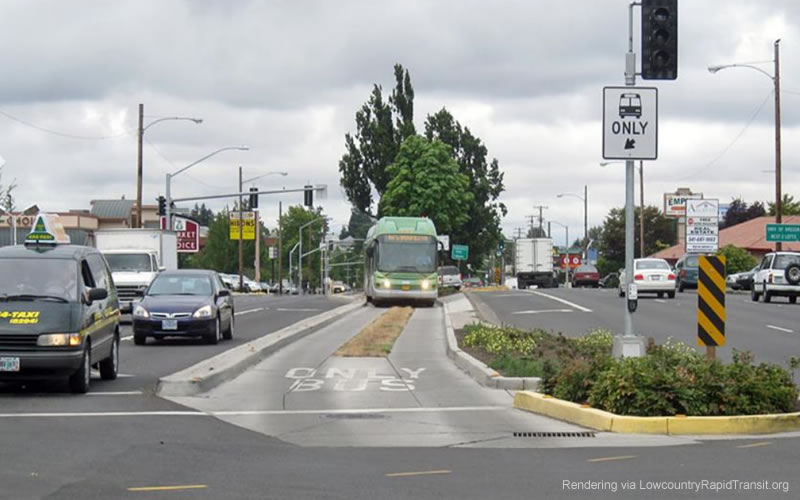


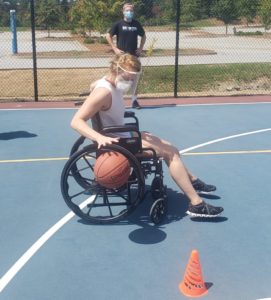
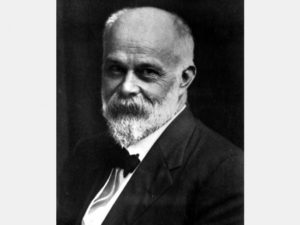
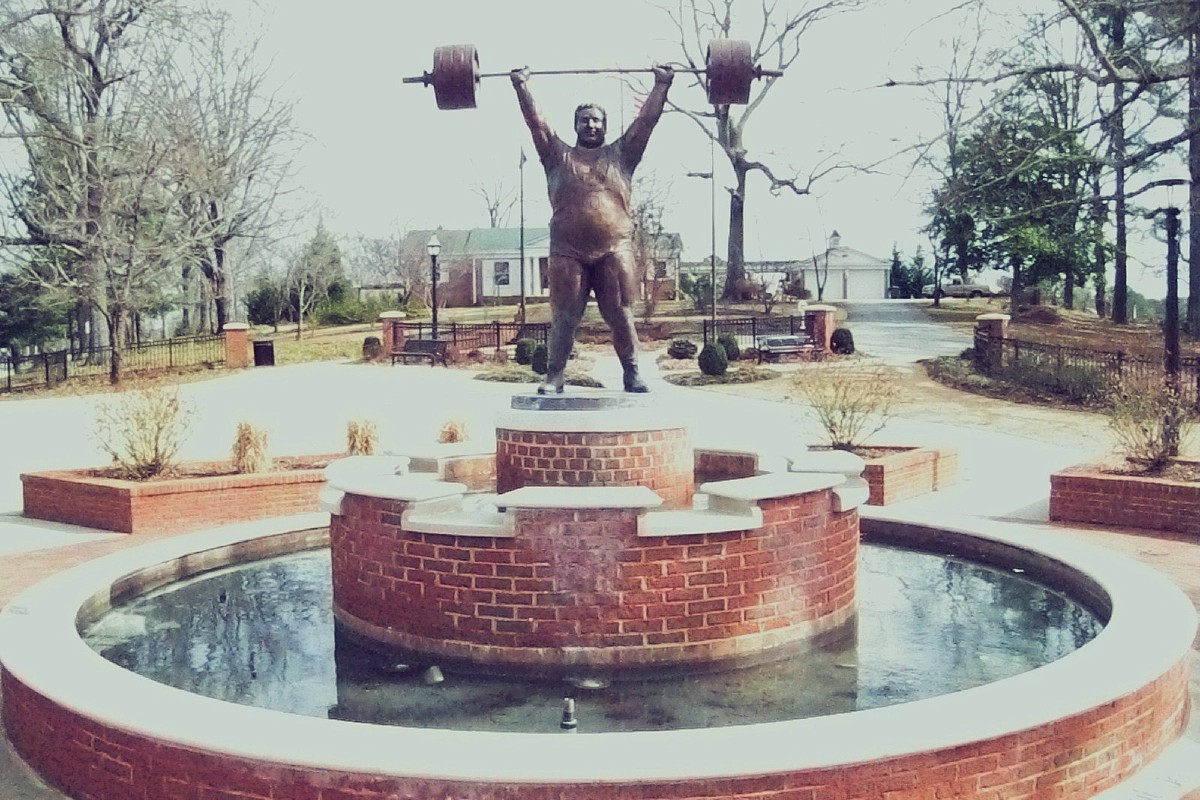







Follow Us